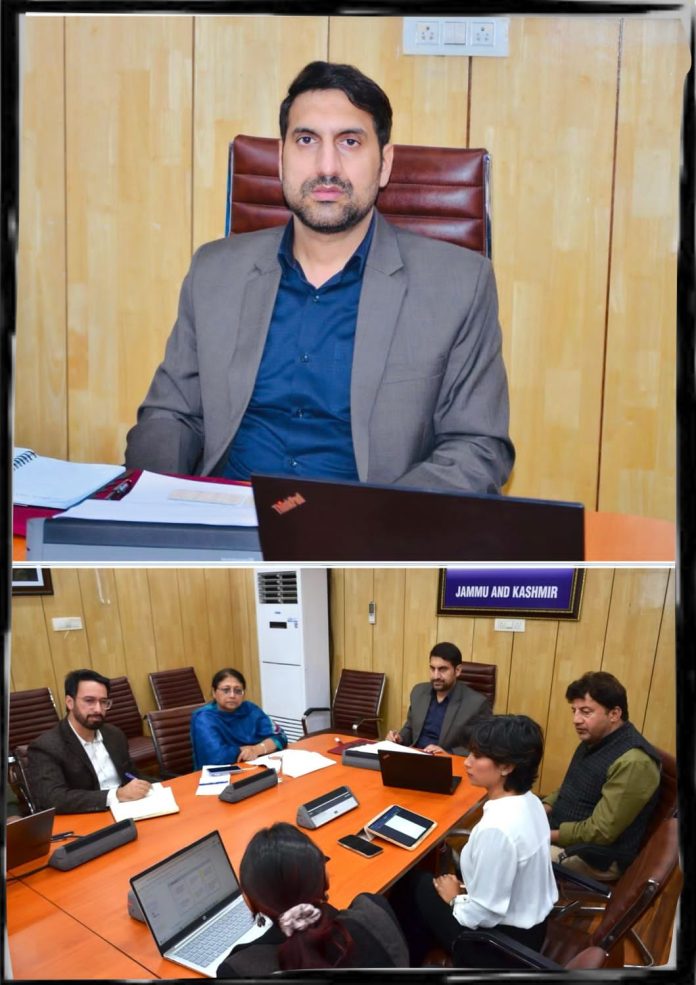We are creating a culture of enterprise, not just employment: Secretary RDD
SRINAGAR: Secretary, Rural Development Department (RDD) and Panchayati Raj, Mohammad Aijaz Asad, today finalized an action plan under which the Jammu & Kashmir Rural Livelihoods Mission (JKRLM), in collaboration with Kerala’s acclaimed Kudumbashree Mission, will establish 20 standardized food service enterprises across the Union Territory.
Chairing a review meeting of JKRLM, Secretary said that the partnership with Kudumbashree aims to replicate a proven, holistic ecosystem for enterprise development. “The focus goes beyond creating food stalls—it is about building a structured, sustainable, and quality-driven framework for women entrepreneurs,” he emphasized.
As part of the plan, a baseline study will identify potential locations, while standardized training modules and continuous mentorship will ensure long-term viability of the enterprises. A unified brand and operational guideline will be developed to maintain consistency in quality and service across all units.
A dedicated Kudumbashree National Resource Organization (NRO) team has already been positioned to oversee the rollout, which includes ‘Café Mentor’ training and the creation of a cadre of Master Community Resource Persons (MCRPs) to provide on-ground support. “An enterprise monitoring system will also be put in place to track progress and provide sustained handholding to women entrepreneurs,” the Secretary added.
Aijaz Asad highlighted that JKRLM is intensifying efforts under the “Lakhpati Didi” initiative, with a strategic shift towards nurturing “Millionaire Didis.” The goal is to help women from Self-Help Groups (SHGs) move from earning ₹1 lakh annually to ₹10 lakh and beyond. “So far, 50 women in Jammu and Kashmir have already achieved this milestone, proudly earning the title of ‘Millionaire Didi’,” he informed.
This remarkable success was nationally recognized during the launch of the compendium “Har Didi Ek Kahani” in Jammu & Kashmir on July 3, 2025, unveiled by Union Minister for Rural Development Shri Shivraj Singh Chouhan during his visit to Jammu and Kashmir.
The Secretary directed officials to strengthen credit linkages for SHGs, Farmer Producer Organizations (FPOs), and Custom Hiring Centres (CHCs), and to enhance convergence with Mission YUVA, PM Formalisation of Micro Food Processing Enterprises (PMFME), and the Lal Ded Stree Shakti Scheme. These efforts, he said, are aimed at maximizing employment generation and ensuring sustainable livelihoods for rural women across the UT.
Emphasizing the importance of capacity building, Aijaz Asad instructed officials to establish Community-Managed Training Centres (CMTCs), identify local resource persons, and foster a culture of collective learning and participation.
“We are committed to making rural Jammu and Kashmir a hub of women-led entrepreneurship and inclusive growth,” the Secretary affirmed, outlining a clear roadmap for the Mission’s next phase of expansion and impact.
Presenting a comprehensive overview, Managing Director, JKRLM, Subhra Sharma, highlighted that under the UMEED Programme, 7.66 lakh rural households have been mobilized into 94,962 SHGs across 20 districts and 265 blocks. These groups have received ₹528.86 crore in capitalization support and have collectively accessed ₹2,806.06 crore in bank credit since 2013–14, reflecting a strong credit culture and repayment discipline.
Under the Start-up Village Entrepreneurship Programme (SVEP), 7,280 rural enterprises have been established across 14 blocks, with ₹16.53 crore disbursed through the Community Enterprise Fund.
JKRLM has also signed an MoU with the National Resource Organisation (OMPLIS) to strengthen Cluster Level Federations (CLFs) and set up Community Managed Training Centres (CMTCs) for training needs assessment, module development, and exposure visits—further accelerating the rural entrepreneurship ecosystem.


